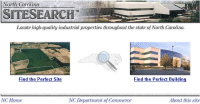North Carolina Department of Commerce
Environmental Sustainability Report - 2000
Commerce Improves Sustainability and Effectiveness via Internet-Based Efforts
 |
During the past year, the NC Department of Commerce has taken an aggressive approach to using the web and saving money and natural resources by bringing on-line every significant interaction the Department has with the public, business partners, and allies by the end of calendar year 2000. Leza Aycock, Assistant Secretary, serves as the Sustainability Officer for the Department of Commerce. Commerce Online 2000!This initiative, dubbed Commerce Online 2000!, began with the re-design of the Department's web site, bringing together for the first time over 15 different web sites that had previously represented the Department's online presence. The new site is accessible at www.nccommerce.com |
Invest NCCommerce Online 2000! continued with the creation of a business development web site especially targeted at getting out the message that North Carolina truly is A Better Place for Business. This site incorporates much of the material used by state and local economic developers in marketing North Carolina to potential clients, now making it available at the click of a mouse. The new business development web site is at www.investnc.com. |
 |

Visit NCIn 1999, tourism generated $11.9 billion for our state. With an estimated 44 million visitors each year, North Carolina enjoys the opportunity of answering questions from, coordination information for and mailing information to hundreds of thousands of people. In 1998, the Department's Division of Tourism, Film and Sports Development co-sponsored the creation of a cost-efficient and comprehensive state-of-the-art inquiry center, focused around a web-based information system, which can handle a large number of calls quickly, efficiently, and in a customer-friendly manner. The web address is www.visitnc.com, and the toll-free number is 1-800-VISIT-NC. Housed at an inquiry-processing center at Women's Correctional Center and staffed by inmates, this system is maintained electronically by tourism partners throughout the state via a single database, thus eliminating faxing, mailing, and re-keying necessary changes. In addition, this network ensures that inquirers will receive current and accurate information. The web-based system also allows visitors to request and receive customized tourism information via the Internet without going through the traditional telephone or mail inquiry process. More than 630,000 user sessions, averaging nearly nine minutes per session, and more than 26 million hits were recorded at the new web site. The first four months of 2000 have seen a 105 percent increase. In April 2000 alone, 140,000 users visited the site. |
Commerce Application Portfolio (CAP)
The second CAP application, deployed in August 1999, is a project-tracking system for the Commerce's Division of Community Assistance (DCA). This web-based system, allows community planners around the state to track their project activities related to requests for DCA assistance. CAP is just beginning but the benefits in efficiency, resources, and customer service are already apparent. |
NC@Your ServiceThe effectiveness and practicality of on-line services was the driving force behind the restructuring of the state home page and the new NC @ Your Service initiative launched by Gov. Hunt in April 2000 (click here for press release issued on 4/4/2000) and developed by Commerce's Information Technology Services Division. The new web site at www.ncgov.com will serve as a single point of entry for four web portals or doorways to services and information. These portals will reduce bureaucratic barriers, increase efficiency and provide added convenience by making state government resources available 24 hours a day, seven days a week. The portals are: |
 |
|
|
The Employee Central portal is up and operational and the other options will be coming on line during the coming months. NC @ Your Service is the first venture of the E-Commerce Steering Committee appointed by Gov. Hunt in January 2000, chaired by state Commerce Secretary Rick Carlisle and charged with:
|
Saving EnergyCommerce's Energy Division is responsible for helping North Carolina preserve its energy resources, help residents save money and work to protect the environment. In 1999, the Division was involved in a variety of sustainability-focused programs including:
|
 To increase the effectiveness of business development programs, a new
series of integrated business applications was conceived. These business
software applications, collectively known as the Commerce Application
Portfolio (CAP), will allow the department to track and share business
development information much more effectively than with the past
collection of stand-alone record-keeping systems.
To increase the effectiveness of business development programs, a new
series of integrated business applications was conceived. These business
software applications, collectively known as the Commerce Application
Portfolio (CAP), will allow the department to track and share business
development information much more effectively than with the past
collection of stand-alone record-keeping systems.